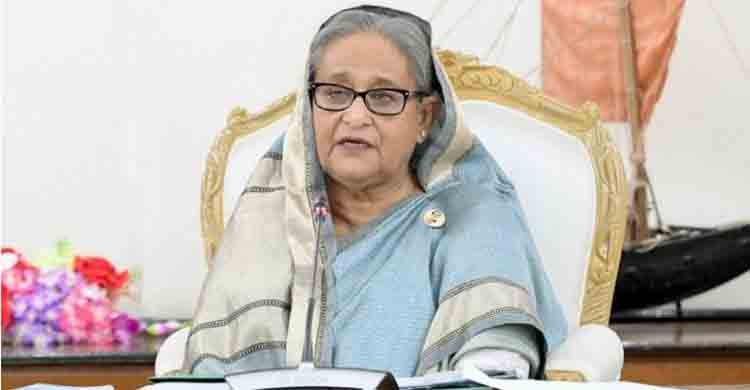PM calls for building equality-based society
24 March 2023, 06:59 pm | Updated: 06 April 2025, 01:20 pm

Prime Minister Sheikh Hasina has called upon all, including global people, to build a society based on equality and free from all kinds of discrimination and sectarianism.
"We follow Father of the Nation Bangabandhu Sheikh Mujibur Rahman's peace policy in running the country," she said in a message on the eve of the Genocide Day-2023.
The Prime Minister said, "We do not want war and conflict; killing men, women, and children dipped us in demise. We believe in peace. If sustainable peace prevails, the overall development of the country accelerates."
She said Awami League formed the government after being elected by popular mandate in 1996 after a long 21-year struggle, adding, "On October 5, 1998, we accessed the United Nations Convention on the Prevention and Punishment of the Crime of Genocide. In 1997, we proposed a resolution on the Culture of Peace at the UN General Assembly, which was adopted in 1999. Accordingly, United Nations declared 2000 as the 'International Year for the Culture of Peace' and 2001-2010 as the 'International Decade for a Culture of Peace and Non-Violence.' We have been working tirelessly for more than fourteen years since 2008 to transform the fate of the people with their unwavering support in all elections."
In the meantime, Sheikh Hasina said, they tried the perpetrators of crimes against humanity and war criminals by establishing the International Crimes Tribunal.
"We ensured the people's right to vote through the Fifteenth Amendment to the Constitution, which also barred the illegal seizure of power. A book titled 'The Blood Telegram: Nixon, Kissinger, and a Forgotten Genocide' was published in 2013, where the brutality of genocide carried out by Pakistanis in Bangladesh was described as reported by Mr. Archer K. Blood, the then American Consul General in Dhaka to the State Department. We have recognized March 25 as 'Genocide Day. We have sheltered more than 1.1 million displaced Rohingya people who escaped with their lives from genocide in neighboring Myanmar," she said.
The premier said, "We are working on the principle of 'Zero Tolerance' to eradicate militancy and terrorism. We have already made Bangladesh a developing country Bangladesh in 2041 will be 'Smart Bangladesh.' We are formulating and implementing the 'Bangladesh Delta Plan-2100': Future generations will be able to implement this plan with the amendment of their need."
She said President Bangabandhu Sheikh Mujibur Rahman, the Father of the Bengali nation, was released from solitary confinement in Pakistan, returned to his beloved independent motherland on January 10, 1972, and devoted himself to rebuilding the war-torn country.
With the help of the allies, though there was an empty treasury, he rehabilitated the displaced people, restored and developed the infrastructure, and put the production sector and the economy on a solid foundation, she said.
"In just three and a half years, the UN recognized the country as a Least Developed Country. But our misfortune is that the defeated anti-independence clique of '71 continues to conspire against him," Sheikh Hasina added.
On another mourning night on August 15, 1975, the incumbent President, Bangabandhu Sheikh Mujibur Rahman, was martyred by brutal bullets along with his family members, she said.
The Prime Minister said the murderous Mostaq-Zia and their successors illegally seized power and established a dictatorship in the country and the BNP tarnished the proud history of the Bengali nation by placing the perpetrators of the infernal massacre on March 25, criminals against humanity and war criminals, and murderers of the Father of the Nation, in the government.
"On this day (March 24) in 1971, the invading forces of Pakistan carried out the most barbaric crackdown in Bangladesh. I remember with a heavy heart all martyrs who sacrificed their lives on the night of March 25. 1971, whose fresh blood inspired the brave Bengalis to be spirited to take up arms and fight for independence," the Prime Minister said.
The greatest Bengali of all time, Father of the Nation Bangabandhu Sheikh Mujibur Rahman, spent his whole life for liberating the Bengali nation shackled for thousands of years, she said, adding that he was first arrested and imprisoned on 11 March 1948 while protesting to protect the dignity of the Bengali language.
Highlighting Bangabandhu's struggling life, she added that since then, he led all the movements, including the language movement of '52, the twenty-one point of '54, the anti-Ayub movement of '62, the six points of '66, the mass upsurge of '69 with great foresight.
"After the mass uprising of 1969, on December 5, on the death anniversary of Huseyn Shaheed Suhrawardy, he declared, "From now on, the name of this eastern country of Pakistan will be Bangladesh only, instead of East Pakistan," she continued.
He left the Minister's portfolio and organized and strengthened the party, and prepared the whole nation for independence through struggle, she said.
The premier went on saying that the Awami League (AL), led by the Father of the Nation, won a single majority in the National Assembly in the '70 elections.
However, the Pak-military junta started delaying the transfer of power, she added.
By procrastinating in the name of the meeting, they launched a secret conspiracy to kill the unarmed Bengalis, she said, adding that Bangabandhu Sheikh Mujib called for a non-cooperation movement from March 2. In his historic speech on March 7, he gave a clear outline of the goal of overcoming the long 23-year rule and exploitation and called for compliance with the 35-point directive from March 15, she added.
Bangabandhu Sheikh Mujib's instructions were followed verbatim throughout East Bengal, she continued.






















